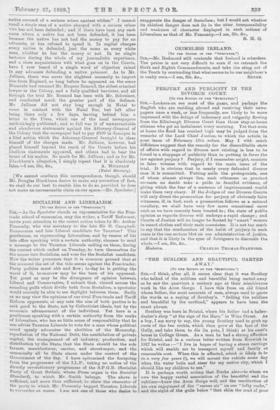PERJURY AND PUBLICITY IN THE DIVORCE COURT.
[To TI110 EOITOR OP VIII *8P110TATOP.."] Sin,—Lookers-on see most of the game, and perhaps the English who are residing abroad and receiving their news- papers once a week, or less frequently, are likely to be more impressed with the deluge of indecency and vulgarity flowing from the Edinburgh Divorce Court than those stay-at-home Citizens who get an instalment every morning. Yet that even at home the good has reached high may be judged from the remarks of the Lord Chief justice, to which the article in your issue of February 13th refers. May I with much diffidence suggest that the remedy for the discreditable state of affairs with regard to divorce now existing is leas to. be found in a stoppage of publicity than in putting in force the law against perjury P Perjury, if I remember aright, consists in false witness with regard to the main issue of the trial., It is obvious that in nearly every defended divorce case it is committed. Putting aside the protagonists, one of whom almost always lies, such witnesses as prurient servants no doubt take a pride in fanciful evidence, of giving which the fear of a sentence of imprisonment would make them very chary. If the Judges of our Divorce Courts will only direct the prosecution for perjury of obviously false witnesses, if, in fact, such a prosecution follows as a natural corollary, we shall have very few more sensational cases such as we have recently been treated to ; the state of public opinion as regards divorce will undergo a rapid change ; and Courts of Justice will no longer be flouted by" smart" women in smart clothes and their male associates. It is not too much Lo say that the condonation of the habit of perjury in such cases is the one serious blot on our administration of justice, 4nd that it is likely in the eyes of foreigners to discredit the whole.—I am, Sir, &c., Madeira. CHARLES THOMA,S•STANFORD.






































 Previous page
Previous page